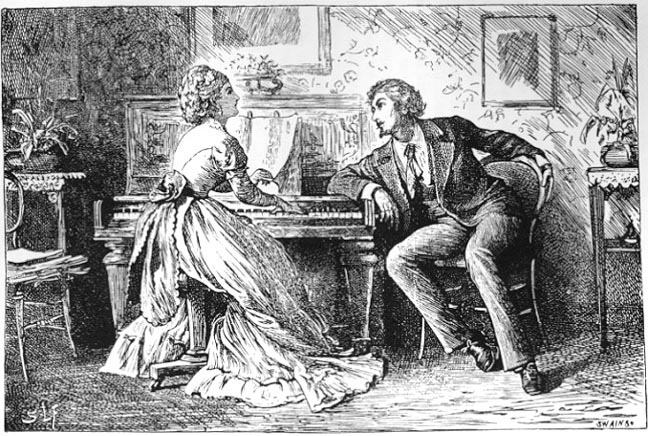
"How that song makes me wish we were back again, where I heard it first" by Sir Luke Fildes; engraver, Swain. Fourth illustration for Charles Lever's Lord Kilgobbin: A Tale of Ireland in Our Time, facing p. 66. Reprinted from the December 1870 number of the Cornhill Magazine, Vol. XXII, facing p. 738. 10.6 cm by 15.9 cm (4 ⅛ by 6 ¼ inches), framed. Third serial illustration, Part 3, Chapter X, "The Search for Arms," facing page 738. [Click on the illustration to enlarge it.]
Passage Illustrated: Nina at the castle piano, recalling happier times in Albano

Right: The initial page for the third instalment in Volume XXII of the Cornhill Magazine (December, 1870), 738.
"How I wish Lockwood had come out here with me," said Walpole, almost uttering a thought.
"That is, you wish he had seen a bit of barbarous Ireland he’d scarcely credit from mere description. But perhaps I’d have been better behaved before him. I’m treating you with all the freedom of an old friend of my cousin’s."
Nina had meanwhile opened the piano, and was letting her hands stray over the instrument in occasional chords; and then in a low voice, that barely blended its tones with the accompaniment, she sang one of those little popular songs of Italy, called "Stornelli" — wild, fanciful melodies, with that blended gaiety and sadness which the songs of a people are so often marked by.
"That is a very old favourite of mine," said Walpole, approaching the piano as noiselessly as though he feared to disturb the singer; and now he stole into a chair at her side. "How that song makes me wish we were back again, where I heard it first," whispered he gently.
"I forget where that was," said she carelessly.
"No, Nina, you do not," said he eagerly; "it was at Albano, the day we all went to Pallavicini's villa."
"And I sang a little French song, "Si vous n’avez rien à me dire," which you were vain enough to imagine was a question addressed to yourself; and you made me a sort of declaration; do you remember all that?"
"Every word of it." [Chapter X, "The Search for Arms," pp. 65-66]
Commentary: Nina once again at the piano
In his determination to use this third serial illustration to introduce the sophisticated Cecil Whalpole into the narrative and situate him in Kilgobbin Castle as Nina entertains him at the piano, Fildes has passed up the opportunity to show Kate Kearney skilfully employing various percussion-cap firearms to defend the main gate against "The Boys," a mob of local Fenians who are going from one great-house to next in search of firearms with which to stage their rebellion. Through the quiet parlour scene preceding Kate's confronting the mob Fildes underscores the blonde Nina's previous relationship with the young English diplomat whom she met in Italy, setting up the possibility for romance. Whalpole's being injured in aiding Kate in defence of the castle leads to his being invited to remain and recuperate at Kilgobbin, despite Matthew Kearney's absence at a local agricultural fair. Dick Kearney, reading of her heroism in the Dublin papers, hastens to Moate in company with the quizzical Joe Atlee.
Scanned images and commentary by Philip V. Allingham. [You may use these images without prior permission for any scholarly or educational purpose, as long as you (1) credit the person who scanned them, and (2) link your document to this URL in a web document or cite the Victorian Web in a print one.]
Bibliography
Lever, Charles. Lord Kilgobbin. The Cornhill Magazine. With 18 full-page illustrations and 18 initial-letter vignettes by S. Luke Fildes. Volumes XXII-XXV. October 1870-March 1872.
Lever, Charles. Lord Kilgobbin: A Tale of Ireland in Our Own Time. With 18 Illustrations by Sir Luke Fildes, R. A. London: Smith, Elder, 1872, 3 vols; rpt., Chapman and Hall, 1873.
Lever, Charles. Lord Kilgobbin. Illustrated by Sir Luke Fildes. Novels and Romances of Charles Lever. Vols. I-III. In three volumes. London: Smith, Elder, 1872, Rpt. London: Chapman & Hall, 1873. Project Gutenberg. Last Updated: 19 August 2010.
Stevenson, Lionel. Chapter XVI, "Exile on the Adriatic, 1867-1872." Dr. Quicksilver: The Life of Charles Lever. New York: Russell and Russell, 1939; rpt. 1969. Pp. 277-296.
Sutherland, John A. "Lord Kilgobbin." The Stanford Companion to Victorian Fiction. Stanford, Cal.: Stanford U. P., 1989, rpt. 1990, 382.
Created 24 October 2007 Updated 6 June 2023